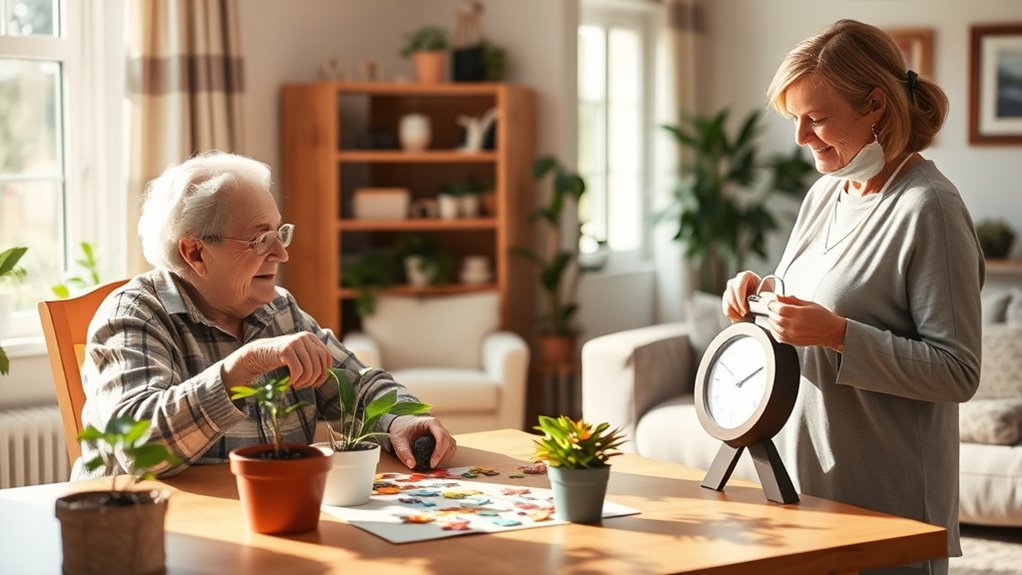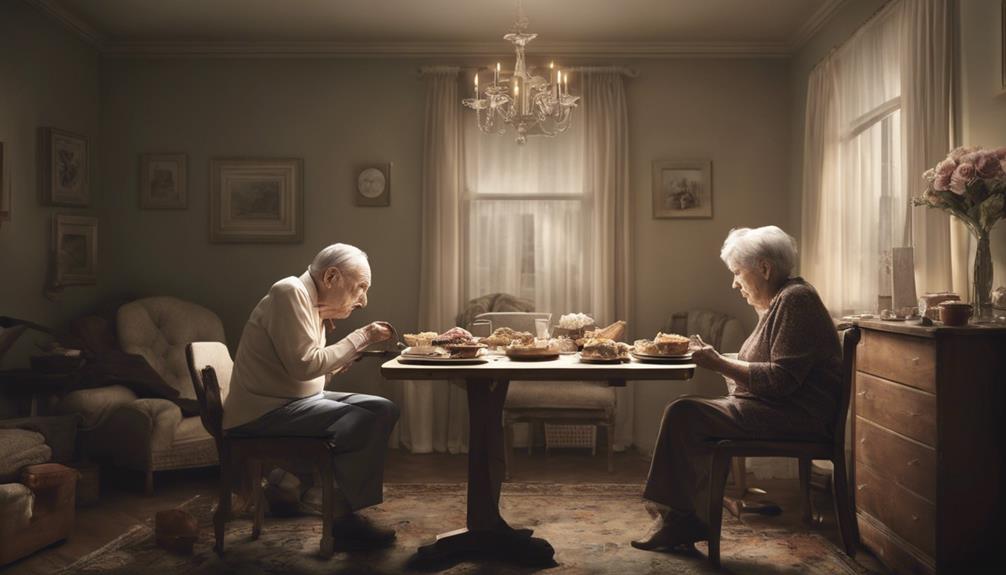Creating a daily routine for someone with dementia helps reduce behavior problems by providing predictability and reassurance. Keep activities consistent and schedule them at regular times each day, including meals, rest, and engaging tasks like puzzles or reading. Use simple, calm communication and a familiar environment to ease anxiety. Pay attention to their individual preferences and introduce changes gradually. If you keep this approach, you’ll find it easier to maintain calm and stability—more helpful tips follow.
Key Takeaways
- Establish a consistent daily schedule with designated times for activities, meals, rest, and bedtime.
- Incorporate cognitive exercises like puzzles or reading to promote mental engagement.
- Use clear, calm communication and reassure during transitions or new activities.
- Personalize routines based on individual preferences and cues to enhance cooperation.
- Maintain a calm, organized environment to reduce confusion and behavioral issues.

Establishing a consistent daily routine can substantially reduce behavior problems in individuals with dementia. When you create a predictable schedule, it helps reduce confusion and anxiety, which are often triggers for agitation or aggression. A well-structured day provides a sense of security, making it easier for your loved one to navigate daily activities. Incorporating cognitive exercises into this routine is an effective way to keep their mind engaged and slow cognitive decline. Simple activities like puzzles, memory games, or even reading together can stimulate their brain and create a positive focus during the day. These exercises not only foster mental sharpness but also give your loved one a sense of accomplishment, which can improve mood and reduce behavioral outbursts.
Effective caregiver communication plays a vital role in establishing and maintaining this routine. When you communicate clearly and calmly, it minimizes misunderstandings that could lead to frustration. Use simple language, maintain eye contact, and be patient if your loved one struggles to understand or respond. Repeating instructions gently and offering reassurance helps them feel safe and supported. As you develop the routine, pay attention to their cues and preferences; this personalized approach enhances cooperation and reduces resistance. Consistent communication also involves explaining upcoming activities or shifts, so they know what to expect, which alleviates anxiety. Additionally, appliance maintenance plans can ensure that household devices operate smoothly, reducing potential stressors caused by appliance malfunctions. You should also set specific times for meals, activities, rest, and bedtime to establish a predictable rhythm throughout the day. Keep the environment calm and free of unnecessary noise or distractions during these times. When you introduce new activities or changes, do so gradually, providing reassurance and positive reinforcement. This consistency helps your loved one anticipate what comes next, reducing feelings of confusion and frustration that often lead to behavioral issues.
Frequently Asked Questions
How Can I Adapt Routines for Advanced Dementia Stages?
You can adapt routines for advanced dementia by emphasizing personalized activity planning that matches their current abilities and interests. Use caregiver training strategies to stay flexible, simplifying tasks and providing clear cues. Focus on familiar activities and calming techniques, and maintain consistency to reduce confusion. Regularly observe your loved one’s responses and adjust routines accordingly, ensuring they feel safe and engaged while minimizing agitation or distress.
What Activities Are Best for Dementia-Related Agitation?
You can reduce dementia-related agitation by engaging in activities like music therapy, which calms and stimulates the mind, and pet interactions, providing comfort and companionship. These activities help soothe anxiety, promote relaxation, and give a sense of purpose. Incorporate gentle, familiar tunes or soft pet interactions into your loved one’s routine, ensuring they feel safe and supported. Keep activities simple and observe their responses to tailor to their needs.
How Do I Handle Resistance to Routine Changes?
When your loved one resists routine changes, use behavior modification techniques by introducing adjustments gradually. Communicate calmly and clearly, explaining why the change is necessary, and listen to their concerns. Stay patient and consistent, reinforcing positive behaviors. Your caregiver communication should focus on reassurance and understanding, which helps reduce resistance. Over time, this approach fosters trust and makes routine adjustments smoother, improving overall well-being.
Are There Specific Routines for Nighttime Sleep Improvement?
Yes, establishing specific routines can improve nighttime sleep. Focus on sleep hygiene by maintaining a consistent schedule, limiting naps, and avoiding caffeine before bed. Incorporate calming bedtime rituals, like reading or gentle music, to signal it’s time to sleep. Keep the environment comfortable and dark. These routines help reduce confusion and agitation, promoting better, more restful sleep for someone with dementia.
How Can Technology Support Daily Routines for Dementia Care?
Sure, technology’s here to rescue you from the chaos! You can use assistive devices and reminder apps to keep your loved one on schedule, preventing those dreaded behavior problems. These tools act like digital babysitters, gently nudging your loved one when it’s time to eat, take medication, or nap. With tech, you’re less likely to chase after forgotten appointments and more likely to enjoy peace of mind.
Conclusion
Establishing a consistent daily routine can considerably reduce dementia behavior problems, providing stability and comfort. Some experts believe that routine helps brain function by minimizing confusion and anxiety. While research still explores this theory, many caregivers find that predictable schedules improve daily life for their loved ones. By sticking to a routine, you create a calming environment that supports their well-being and may even slow some cognitive decline. Consistency truly makes a difference.








